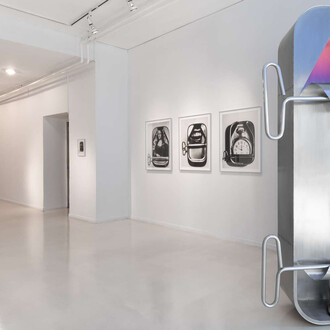Despite the growing awareness in Europe of the importance of recycling, only a third of plastic waste meets this fate annually, even though a major part of packaging comes from plastic. It is quite incredible how easily we discard it after use, even though it could be turned into something useful. True, that would require smaller home recycling plants to serve in lieu of the big ones – those in production halls and out of the public’s reach.
The Toasted Furniture project addresses these issues, bringing the transformation process closer to home, from remote production facilities invisible to most people to a smaller, “do-it-yourself” setting. Waste in the form of plastic flocks is melted using a large home-made toaster and transformed into a semi-finished product – a plastic panel that serves as a raw material for furniture.
The Toasted Furniture exhibition thus showcases experiments with plastic waste – different patterns that the toaster created on the panels and their various uses.
Toasted Furniture proposes a self-production scheme for a material that could be used in a standard furniture-making process. For a while now, Nuša Jelenec and Nina Mršnik, the designers and authors of the exhibition, have been working with a giant toaster that allows them to melt HDPE plastic into sheets which can be used to make other products.
The Toasted Furniture project was one of the projects accompanying the 25th Biennial of Design BIO 25, and was presented as an example of good practice at a special exhibition featured in the framework of this year’s international conference Circular Change.
Nina Mršnik graduated in industrial design at the IUAV University of Venice, while also studying art and visual communications in Aveiro, Portugal. She completed her master studies in product design at the Royal College of Art in London. Before returning to Slovenia in 2010 and forming Grupa, a group of volunteer designers, architects and artisans, she travelled the world working on various projects, including those for Jurgen Bey. She led the Venice and Piran edition of Pop-up Dom, took part in the culinary collective Trapez and conducted design workshops within the international collective The Mobile Workshop Group in Moscow, Ljubljana and London. She is currently busy with Bosnian ćilims, drawing portraits and toasting waste plastic in a home-made toaster.
Nuša Jelenec graduated in industrial design at the Academy of Fine Arts and Design of the University of Ljubljana and complemented her studies at the HDK – School of Design and Crafts at the University of Gothenburg, Sweden. After graduating she worked for the Italian furniture company Lago, where she made a name for herself with the Colletto bed, for which she received the international Elle Decoration International Design Award. Having returned to Slovenia she helped found several multidisciplinary collectives: Zavod Rompom (institute for design production), Trapez (culinary collective) and Re-Generacija (association for socially and environmentally responsive design) as well as the co-working space Creative Zone Šiška and a long-term project Pop-up Dom (Pop-up-Home, a temporary shop/exhibition of young Slovenian designers). She has worked as a freelancer since 2009, working both independently and within various groups on diverse projects spanning industrial and interior design, event design and sustainable design.
















